By Megan Ng
As 2022 comes to an end, the pressure to form and commit to new habits is high. Aggressive “new year, new me” messages can lead to rushed planning and quick burnout. Although they seem like small decisions, habits play an important role in your overall well-being and health. Research shows that somewhere around 43% of our behaviors are made up of small habits (Palmer, 2020). Essentially, our lives are the sum of these daily habits. A big portion of who we are and become is a result of them.
Habit Tracking
Tracking habits is a helpful way to create change as it provides data and feedback. It gives us the opportunity to adjust if we get off track. It also helps us see progress over time. Tracking can include using a mobile application or recording in a journal. Some of these habit-tracking methods can include your friends and family which can provide social support (Gardner, 2012). These can serve as physical reminders of the goals you’ve set and can contribute to motivation and consistency. (Guinness, 2022)
- Streaks for iPhone users
- HabitNow for Android users
- Way of Life for gathering data about your habits
- Habitify for planning your day around your habits
- Productive for those who want guidance on building habits
Start Small
Motivation is a fickle thing. Motivation fluctuates easily and can be gone just as quickly as it came. When looking at the bigger picture, motivation cannot be relied on for long-term change (Gardner, 2019). However, starting small is a great way to begin. Start with a habit so small that you can’t say no when following through (Habit Formation Basics, 2015). The smaller the habit, the easier it is to build into your life. After that, you can increase the habit gradually in small increments.
Raising Resilience
Achieving 100% perfection is unrealistic and unsustainable. Having patience and tailoring your expectations can prevent disappointment and disengagement. Instead of the all-or-nothing approach, strive for consistency and flexibility (Habit Formation Basics, 2015). Being able to come back stronger after a missed day can lead to success for a new and sustainable goal.
Habit Stacking
Habits require repetition to stick. For a new habit to become secure, time and repetition are key for your brain (Palmer, 2020). Instead of going cold turkey on an old habit, integrate a new habit on top of one that already exists. It is typically easier to add things into your life rather than subtract. For example, add in a 10-minute walk before eating lunch if you want to increase your activity; or drink a glass of water before your morning coffee if you want to increase your water intake. If you are interested in how to habit stack more effectively, check out some work from James Clear.
Summary
Habits can be difficult to change, especially with the encroaching new year. Practice patience with yourself and find methods that work best for you. The great news is that a little intention can go a long way in creating new habits and making changes in our lives.
References
- Gardner, B., Lally, P., & Wardle, J. (2012). Making health habitual: the psychology of ‘habit-formation’ and general practice. The British journal of general practice : the journal of the Royal College of General Practitioners, 62(605), 664–666. https://doi.org/10.3399/bjgp12X659466
- Gardner, B., & Rebar, A. L. (2019). Habit formation and behavior change. Oxford Research Encyclopedia of Psychology. https://doi.org/10.1093/acrefore/9780190236557.013.129
- Guinness, H. (2022). The 6 best habit tracker apps in 2022. Zapier. Retrieved November 27, 2022, from https://zapier.com/blog/best-habit-tracker-app/#streaks
- Habit Formation Basics. (2015). Psychology Today. Retrieved from https://www.psychologytoday.com/basics/habit-formation
- Palmer, C. (2020). Harnessing the power of habits. Monitor on Psychology, 51(8). https://www.apa.org/monitor/2020/11/career-lab-habits
Megan Ng is a Graduate Student of Community and Clinical Nutrition at the University of Illinois at Urbana Champaign
Image by Jason Briscoe from Unsplash













